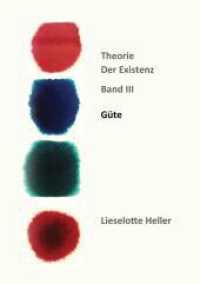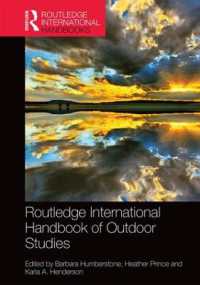Full Description
Fundamental Considerations in Technology Mediated Language Assessment aims to address issues such as how the forced integration of technology into second language assessment has shaped our understanding of key traditional concepts like validity, reliability, washback, authenticity, ethics, fairness, test security, and more.
Although computer-assisted language testing has been around for more than two decades in the context of high-stakes proficiency testing, much of language testing worldwide has shifted to "at-home" mode, and relies heavily on the mediation of digital technology, making its widespread application in classroom settings in response to the COVID-19 outbreak unprecedented. Integration of technology into language assessment has brought with it countless affordances and at the same time challenges, both theoretically and practically. One major theoretical consideration requiring attention is the way technology has contributed to a reconceptualization of major assessment concepts/constructs. There is very limited literature available on the theoretical underpinnings of technology mediated language assessment. This book aims to fill this gap.
This book will appeal to academic specialists, practitioners, or professionals in the field of language assessment, advanced and/or graduate students, and a range of scholars or professionals in disciplines like educational technology, applied linguistics, and teaching English to speakers of other languages (TESOL).
Contents
Acknowledgements
List of contributors
Foreword: Lyle F. Bachman
Chapter 1: Technology mediated language assessment: Key considerations
Karim Sadeghi, Dan Douglas
Section I: Validity Concerns in Technology Mediated Language Assessment
Chapter 2: Validation in remote L2 assessment: Appraising models and frameworks
Scott Walters
Chapter 3: Exploring the Role of Self-Regulation in Young Learners' Writing Assessment and Intervention using BalanceAI Automated Diagnostic Feedback
Eunice Eunhee Jang, Melissa Hunte, Christie Barron,
Liam Hannah
Chapter 4: Balancing construct coverage and efficiency: Test design and validation considerations for a remote-proctored online language test
Larry Davis, John M. Norris, Spiros Papageorgiou, Shoko Sasayama
Chapter 5: From pen-and-paper trials to computer-based test: Impact on validity
Ivy Chen, Ute Knoch
Chapter 6: Evaluating Finnish 9th graders' learning outcomes in English during the pandemic: How valid are the conclusions drawn?
Marita Härmälä, Jukka Marjanen
Section II: Reliability Issues and Machine Scoring
Chapter 7: Exploring rater behaviors on handwritten and typed reading-to-write essays using FACETS
Sun-Young Shin, Senyung Lee, Yena Park
Chapter 8: Validating an AI-driven Scoring System: the Model Card approach
Barry O'Sullivan, Trevor Breakspear, William Bayliss
Chapter 9: Web-based testing and automated scoring: construct conceptualization and improving reliability
Nathan Carr
Section III: Impact, Security and Ethical Considerations
Chapter 10: Testing young multilingual learners remotely: prioritizing equity, fairness, and social justice
Mark Chapman
, Jason A. Kemp, Ahyoung Alicia Kim, David MacGregor, Fabiana MacMillan,
Chapter 11: Improving the impact of technology on diagnostic language assessment
Ari Huhta
Chapter 12: Proctoring remote language assessments
Erik Voss
Section IV: Options and Issues in Technology Mediated Classroom Assessment
Chapter 13: Interdisciplinary collaboration in building the future of Learning Oriented Language Assessment
Nick Saville, Paula Buttery
Chapter 14: Interactional competence in video-mediated speaking assessment in Vietnam
Noriko Iwashita
, Van Trao Nguyen, Hong Giang Nguyen
Chapter 15: Test-taking strategies in technology-assisted language assessment
Andrew Cohen, Teymour Rahmati, Karim Sadeghi
Chapter 16: Researching technology-mediated classroom language assessment practices: Methodological challenges and opportunities
Keith Menary, Luke Harding
Chapter 17: Conclusion
Dan Douglas, Karim Sadeghi







